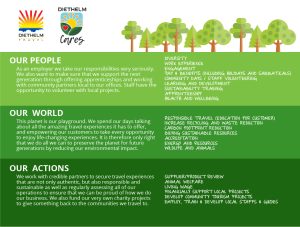We support responsible travel practices by offering ethical animal programmes
- Committing to protecting animals and wildlife in the region.
- ‘Stop sell’ on all tours that involve elephant riding and reviewing all other products that involve animals.
- Work with the supplier that also cares for the animals
Many of Diethelm Travel products involve watching or interacting with animals. While attractions involving animals can have social, economic, environmental and educational benefits, when activities are not carefully managed, they can negatively impact the welfare of the animals and affect our customer’s enjoyment of the experience.
Animal welfare is important to Diethelm Travel, our staff and our customers. We want to help protect animals from exploitation, neglect and cruelty, and we expect our suppliers to share these sentiments. If attractions we offer to our customers are not meeting recognised standards of animal welfare, or involve unacceptable suffering, we will work with the supplier concerned to improve conditions, or remove the attraction from sales.
Diethelm Travel ensures animals involved in the attractions we promote are properly cared for. We have also partnered with an international wildlife conservation organisation that advises us on all activities involving animals to help us further reduce our “Animal Footprint”, or worldwide impact on animals in tourism.
Our ultimate objective is to eliminate practices that have a negative impact on the welfare of animals or that threaten fragile natural habitats and their wildlife.

We aim to achieve this by:
• Auditing all animal attractions we feature in our programmes to ensure they meet good practice criteria.
• Removing animal attractions from our programmes that fail to meet our good practice criteria.
• Encouraging staff, customers and travel partners to report bad practice so we can take action as quickly as possible.
• Raising awareness of the Born Free Travellers’ Animal Alert service (http://www.bornfree.org.uk/TAA) which allows visitors to flag concerns over animal use, abuse or neglect.
• Working closely with the Born Free Foundation, Travelife and other industry partners to uphold the best possible standards in animal welfare.
A new age for elephant experiences
We have stopped offering programmes with organisations that treat elephants unethically to help counteract the negative handling of elephants in Asia. This includes utilising the Association of British Travel Agents’ (ABTA) Global Welfare Guidance for Animals in Tourism to help assess and audit suppliers, eliminating any programmes from suppliers that may not have the elephants’ best interests in mind, such as elephant rides or shows, and working to educate foreign tourists on how to responsibility interact with these fascinating creatures. Diethelm Travel has also created a new Animal Welfare Policy to further develop and guide its future offerings that involve animals of any kind.
As one of the first destination management companies to remove these types of offerings, Diethelm Travel is dedicated to further promoting companies and operators that offer responsible and ethical elephant experiences. These organisations still encourage tourists to interact with elephants, however emphasise educating visitors on the plight of the Asian elephant while tirelessly working to rescue at risk elephants, conserve the current population, and provide adequate treatment and care for elephants.
Why you should think twice about riding an elephant
Daniel Turner, Associate Director for Tourism at the Born Free Foundation, and co-author of ABTA’s Global Welfare Guidance for Animals in Tourism, gives us an insight into elephant trekking: Riding an elephant features on many people’s bucket list when visiting Asia and, more recently, Africa. While some may consider riding on top of the largest land mammal to hold an air of romance, few recognise this practice actually compromises the welfare and survival of these magnificent animals. The majority of elephants used in tourism originate from the wild. Young, wild elephants are selected, removed from their families and then subjected to a brutal process to break their ‘wild’ spirit. This method of making the elephants submissive of their captors is called Phajaan in Thailand. The Asian elephant is classified by IUCN as endangered, with wild populations between 40,000 and 50,000 animals across 13 Asian countries. In Thailand, numbers are between 2,500 and 3,200 wild elephants. An elephant, like any wild animal, can be highly unpredictable and cause severe human injury and even death. A trained elephant should never be regarded as a tame and ‘happy’ animal. On the contrary, they endure hard lives: many are beaten with bullhooks, suffer from permanent spinal injuries as a result of carrying people on their backs and, when not in use, elephants are usually chained up. These conditions are far from the lush forests where elephants live in family groups. Diethelm Travel recognises the travel industry should consider the implications of the use of animals in their holidays and now works with us to review animal-activities, seeking to minimise practices that have a negative impact on individual animals and wild populations. Together, we can persuade other travel businesses to do more for animals.
Report it: If your clients are concerned by any animal welfare issues during their travels, they can report it via Born Free’s Travellers’ Animal Alert at www.bornfree.org.uk/TAA


